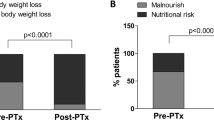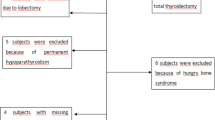Abstract
We have assessed the effects of clodronate (dichloromethylene diphosphonate; Cl2MDP 0.8-3.2g daily by mouth for up to 3 months) in 17 episodes of hypercalcaemia and osteolysis due to carcinoma. Clodronate reduced serum calcium in 14 episodes and bone resorption in all patients. These remained suppressed for the duration of treatment, but recurred promptly when treatment was stopped. Clodronate may be a useful measure for controlling hypercalcaemia and osteolysis in patients with carcinoma.
This is a preview of subscription content, access via your institution
Access options
Subscribe to this journal
Receive 24 print issues and online access
$259.00 per year
only $10.79 per issue
Buy this article
- Purchase on Springer Link
- Instant access to full article PDF
Prices may be subject to local taxes which are calculated during checkout
Similar content being viewed by others
Rights and permissions
About this article
Cite this article
Percival, R., Paterson, A., Yates, A. et al. Treatment of malignant hypercalcaemia with clodronate. Br J Cancer 51, 665–669 (1985). https://doi.org/10.1038/bjc.1985.100
Issue Date:
DOI: https://doi.org/10.1038/bjc.1985.100
This article is cited by
-
The effect of two different doses of oral clodronate on pain in patients with bone metastases
Medical Oncology (1999)
-
Combined therapies with calcitonin and corticosteroids, or bisphosphonate, for treatment of hypercalcemia of malignancy
Journal of Bone and Mineral Metabolism (1997)
-
Rationale for the use of clodronate in osteoporosis
Osteoporosis International (1993)
-
Calcitonin
Der Schmerz (1990)



